In summer, some treasure hunters switch from general ground search to beach hunting. Since this is the place and time when holidaymakers use their jewelry more often. As the detector beeps in anticipation, each sweep brings the promise of an exciting find, making beach metal detecting a rewarding and exhilarating experience.
Join us on a journey along the shorelines where history, mystery, and modern technology converge in the pursuit of uncovering the secrets that lie beneath the surface.
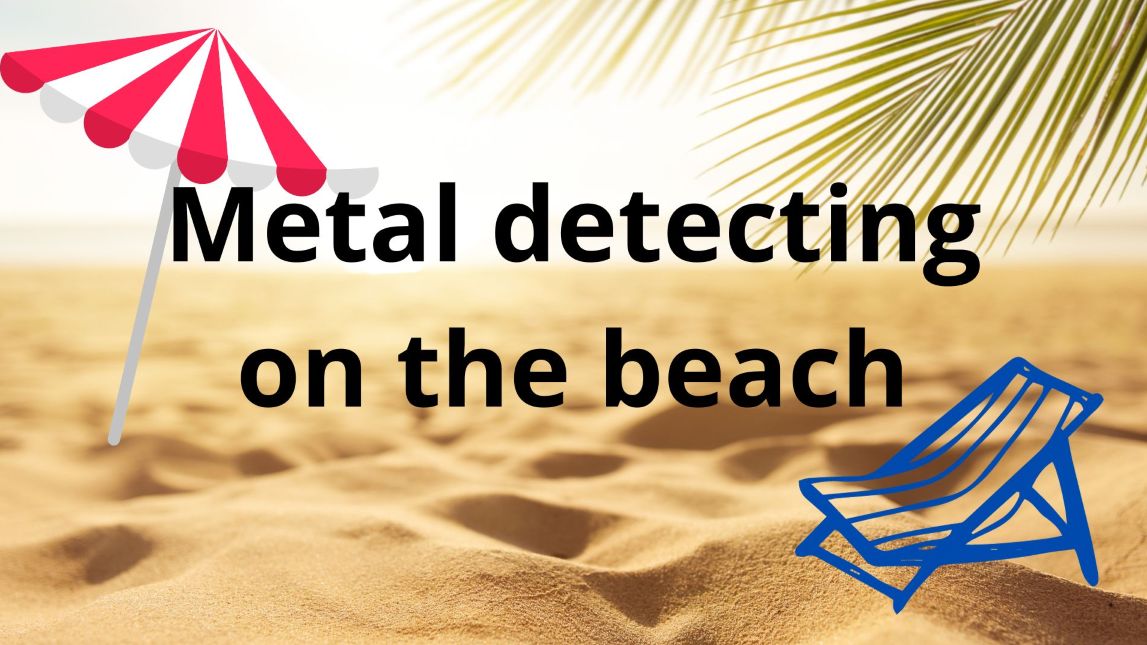
Contents
- 1 Can you use a metal detector on the beach?
- 2 Most common metal detecting finds on beaches
- 3 Equipment You’ll Need
- 4 What is so peculiar about salt water?
- 5 Caring for Your Equipment After Saltwater Use
- 6 Best Spots For Beach Metal Detecting
- 7 When is the best time to detect on the beach?
- 8 Ethics of Metal Detecting on the Beach
Can you use a metal detector on the beach?
Yes, you can use a metal detector on the beach. Beach metal detecting is a popular and enjoyable hobby for many enthusiasts. Beaches are considered excellent locations for metal detecting for several reasons:
- High traffic areas: Beaches are high-traffic areas, attracting numerous visitors daily. This increases the likelihood of finding items left behind by beachgoers, providing metal detector enthusiasts with a diverse range of potential discoveries.
- Lost items: People often visit beaches to relax, swim, and enjoy various activities. In the process, they may accidentally lose items such as jewelry, coins, watches, or keys in the sand.
- Erosion and deposits: Natural processes like erosion and deposits contribute to the movement of sand on beaches. Over time, this activity can bury objects deeper or expose items that were once hidden. Metal detectors help locate items that may have shifted beneath the surface.
- Seasonal changes: Seasonal changes, such as storms and tides, can impact the layout of the beach, redistributing sand and revealing or burying items. This dynamic environment keeps the hobby interesting and adds an element of unpredictability to the search.
- Historical significance: Some beaches have historical significance, where shipwrecks or other events may have occurred. These areas can be rich in artifacts and treasures, making them appealing for metal detecting hobbyists interested in uncovering pieces of history.
While beaches are great places for metal detecting, it’s crucial for enthusiasts to be aware of and comply with any regulations governing metal detecting activities on public or private beaches. Respecting the environment and the rights of others ensures a positive experience for everyone.
It’s important to note that rules and regulations may vary depending on the beach and its location. Before metal detecting on a particular beach, it’s advisable to check with local authorities or the beach management to ensure compliance with any restrictions or guidelines they may have in place. Additionally, respecting the environment and other beachgoers is essential, and hobbyists are often encouraged to fill any holes they dig and follow a code of ethics while metal detecting on public beaches.
Most common metal detecting finds on beaches
Most of the things you find will be beer bottle caps, and I don’t think there is a beach without them nowadays. When digging out a bottle cap, don’t throw it back to the sand; take it with you and throw it into a garbage can later. The next thing after the caps are modern coins.
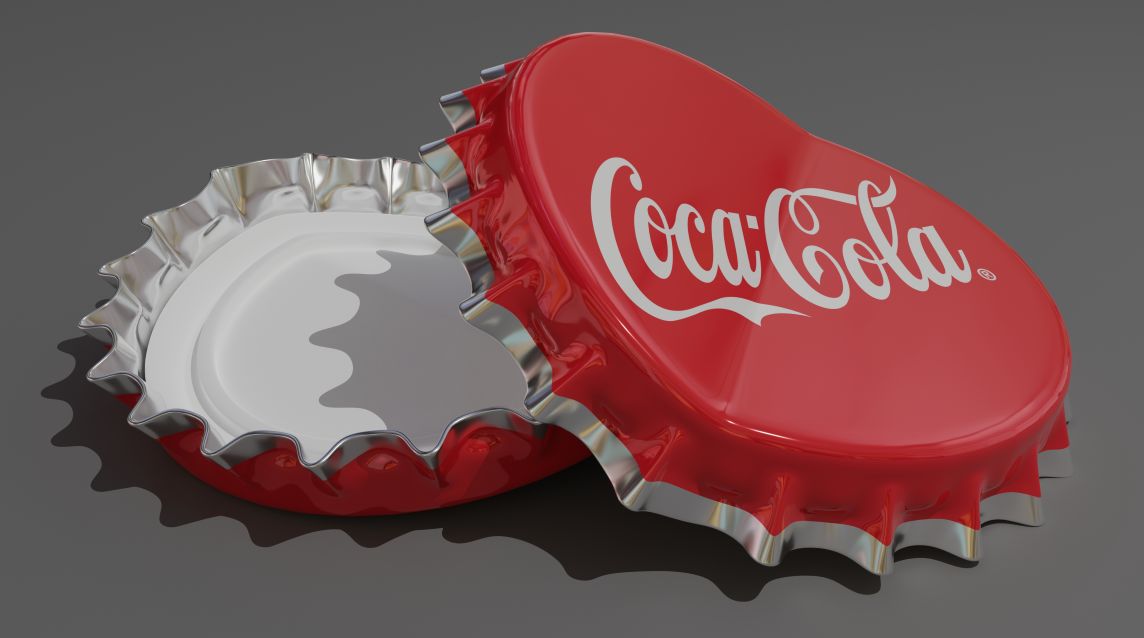
But.
People often lose their chains, rings, earrings, and other jewelry on the beach. Quite seldom, these are golden ones. Also, to be able to find something like this, you’ll have to dig out a dozen or a hundred bottle caps first.
As one of my friends says – who doesn’t dig out bottle caps, can’t find golden rings.
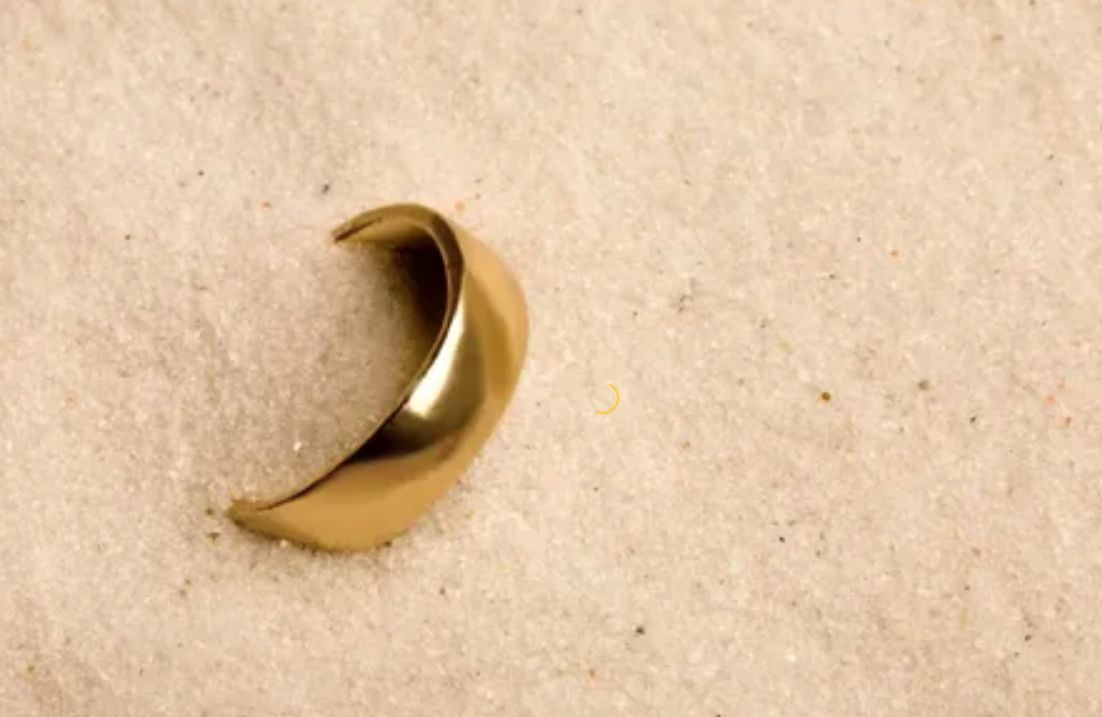
Nevertheless, the money you get after selling the rings you find can be quite significant, and this can be quite essential making for you at the end of the beach season. The best choice, in this case, is a metal detector performing both on the ground and in the water.
There is a wide variety of metal detectors on the market, and they can work on any type of ground. However, for beach hunting, you should select the models that can deal with high soil mineralization level peculiar to the beach sand.
Equipment You’ll Need
Metal detector
Nowadays, almost all manufacturers offer a wide range of metal detectors for beach metal detecting. So that you don’t waste time searching for the right metal detector for you, we have compiled the best metal detectors in one article.
The main thing you should keep in mind during beach hunting is water. The water is close to you, and it is inside the ground. If you get a device without waterproof properties and then put or drop it in the water, you get damage instead of profit – it is quite expensive to mend the device.
The device should have several important functions that you’ll need.
The absence of ground balance function means that it’s not recommended to use the device on the seaside. You will get nothing but disappointment from such a treasure hunting process.
For beach hunting, you will need excellent discrimination function. Each digger finds lots of rubbish – such as bottle caps, foil, beer can tabs, etc. To make sure you won’t be distracted by such rubbish, you will need high-quality discrimination.
It’s good if a metal detector has different ways of target identification (sound, visual, LED, graphical) – they will make it easier to define whether the target is worth digging or not.
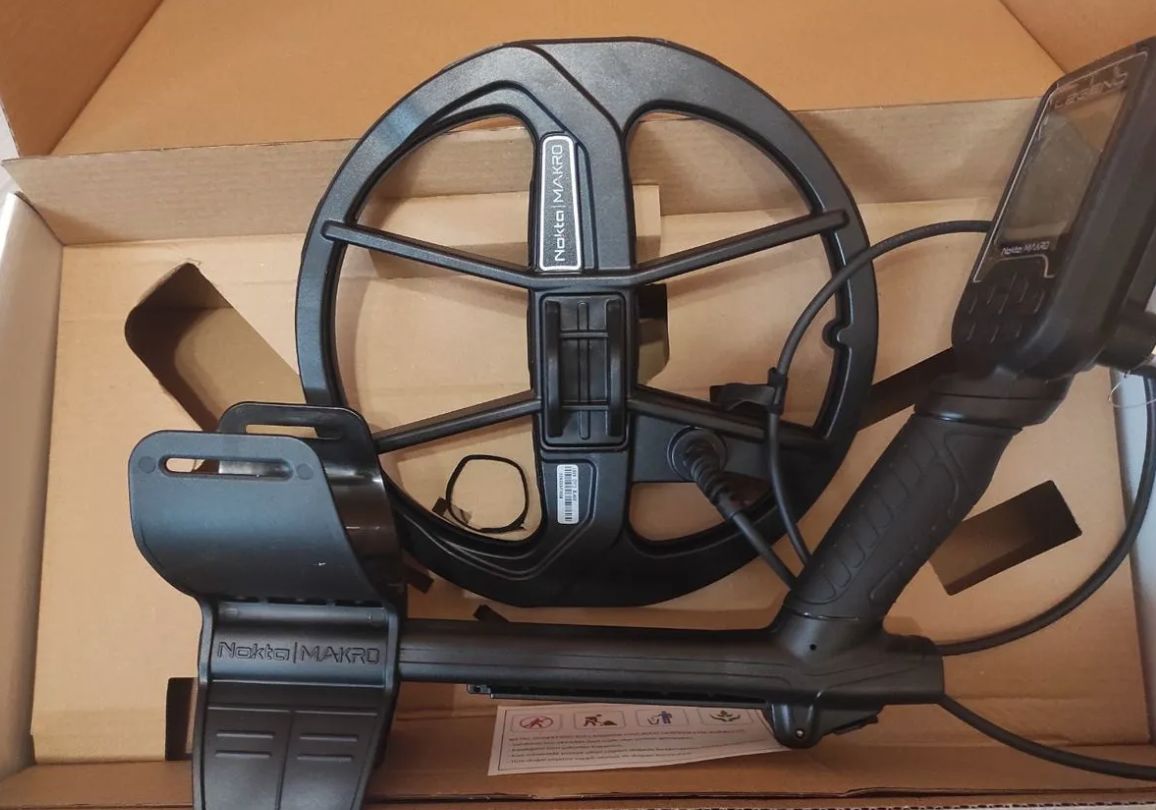
Coil Size
As we know, for more precise target identification, you should minimize the chances of several targets getting under the coil, since beaches are quite trashy. Thus, a search coil for beach hunting shouldn’t be large! For oval-shaped coils – not larger than 6×10 inches, for round ones – not larger than 8 inches, while the perfect coil size is about 6 inches. Also, you should take into account the coil type.
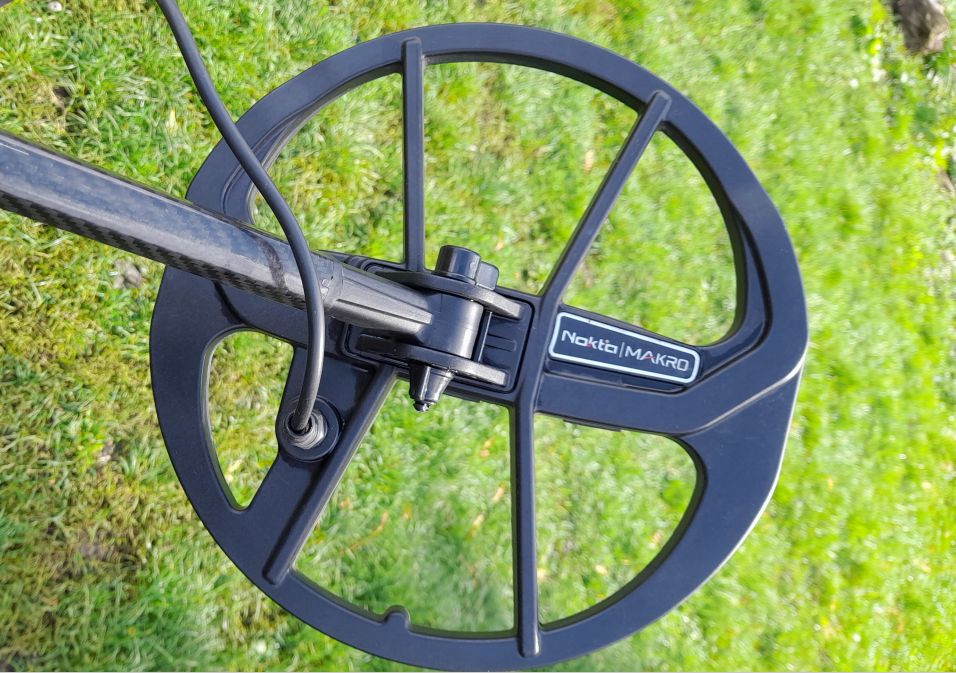
Protection cover for a coil
Stones, sand, corals – all these can scratch the search coil. Even though modern coils are quite good protected, I wouldn’t advise taking chances in this case.
When salt gets dry on surfaces, it affects the device’s performance. If you use protection case for your coil, wash both the coil and the cover after using them in salt water. This will prevent salt accumulation in various slits of the device and affect its performance.
If you don’t have any fresh water close at hand, you can use the coil without a protection case, but clean it dry after that.
Operating frequency
If you have financial means, it’s better to select a metal detector that uses high operating frequency – 13 kHz, 15 kHz, and higher. The first advantage is that high operating frequency is better for the detection of small-sized targets such as earrings, chains, small rings, etc.
The second advantage is that this frequency detects targets with medium electric conductivity, which gold is.
The third one is a better differentiation of metals.
The fourth advantage of the high-frequency search coil is its high protection from electric noise since there are plenty of them in urban settings.
Headphones
Quality headphones amplify the sounds produced by your metal detector, allowing you to detect faint signals that might be missed when using the built-in speaker. By blocking out ambient noise, headphones help you focus on the subtle variations in signals, increasing your chances of identifying valuable targets.
Beaches can be crowded, and the constant beeping of a metal detector might attract unwanted attention. Headphones provide a more discreet way to pursue your hobby without disturbing others.
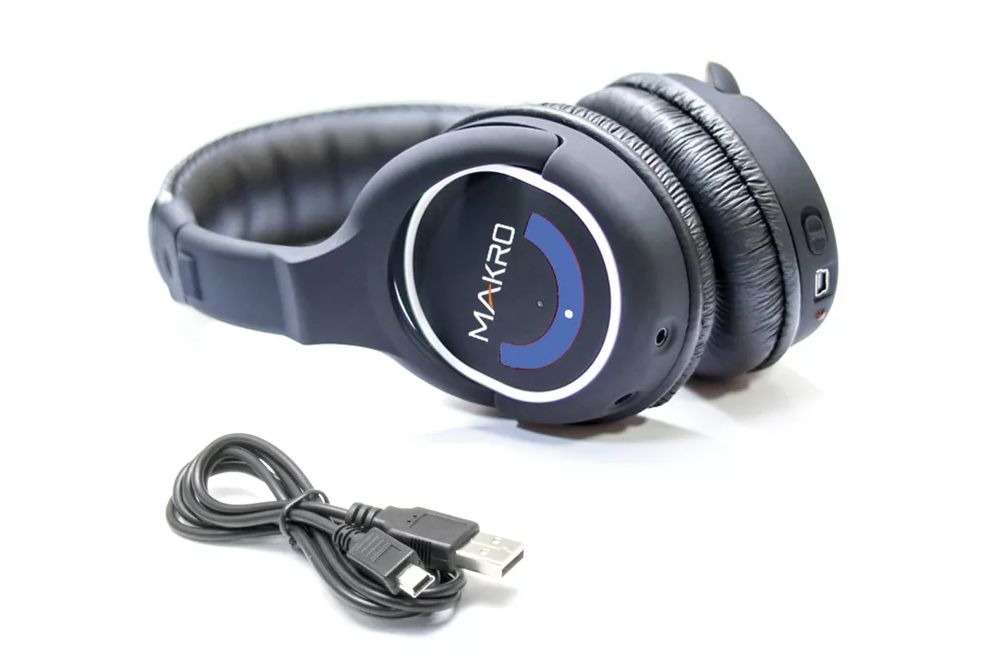
Pouch
Beaches often yield a variety of items, from coins and jewelry to artifacts and debris. A pouch with multiple compartments helps you organize your finds efficiently, preventing them from getting mixed up during your hunt.
Gloves
Besides a metal detector itself, a digger may need good safety gloves. It’s quite easy to cut yourself a finger with broken glass or sharp edges of tin-cans on the beach then when digging in the fields, for example.
A shovel
The next accessory you will need is a shovel. A spade won’t do for beach hunting; the ground is not heavy. That’s why a lightweight wide shovel is better than a heavy spade. You can select one from this rating. They all are of almost the same quality.
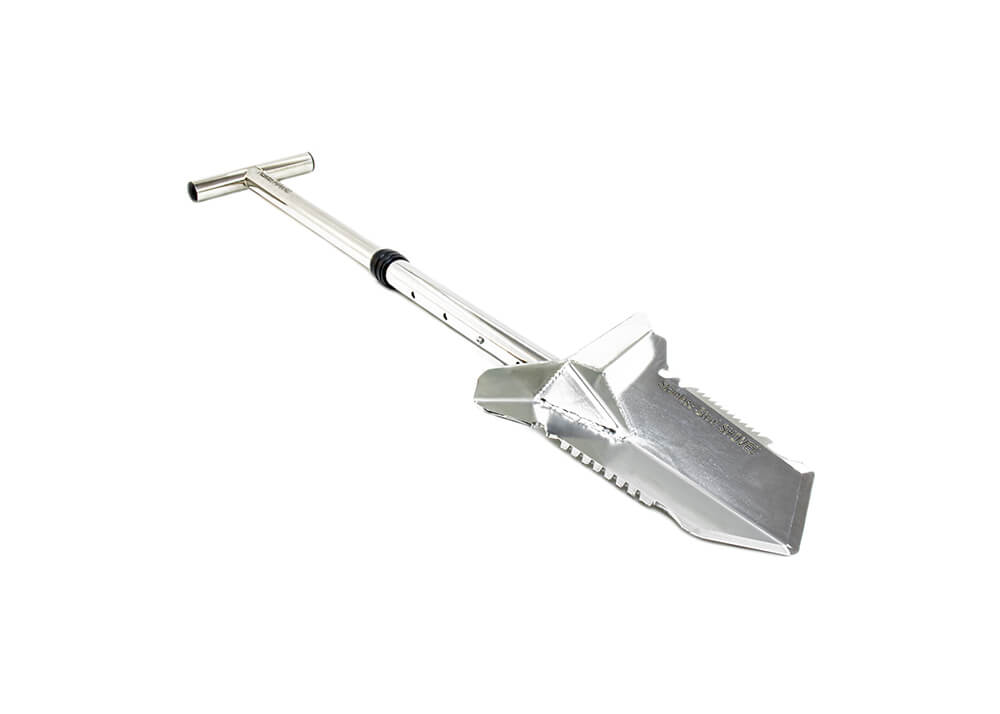
A scoop
If you have serious intentions as for the beach hunting, I’d advise you to get a scoop. This is a perforated metal box with a handle, which you can use to dig and sift the ground. Scoops can be with or without a handle, homemade, and branded ones. Best scoops here.
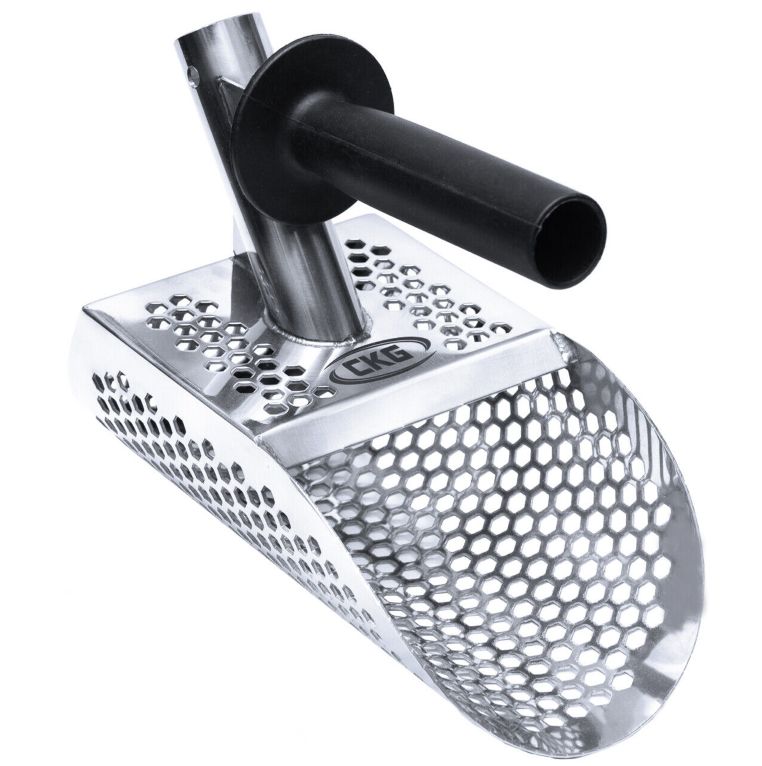
A pinpointer
If you don’t have a scoop, get a pinpointer, since it is quite challenging to find something in the pouring sand. Sometimes I used to spend several minutes to get a coin out of the sand. Keep in mind to get a waterproof device like one of these best pinpointers, for example.
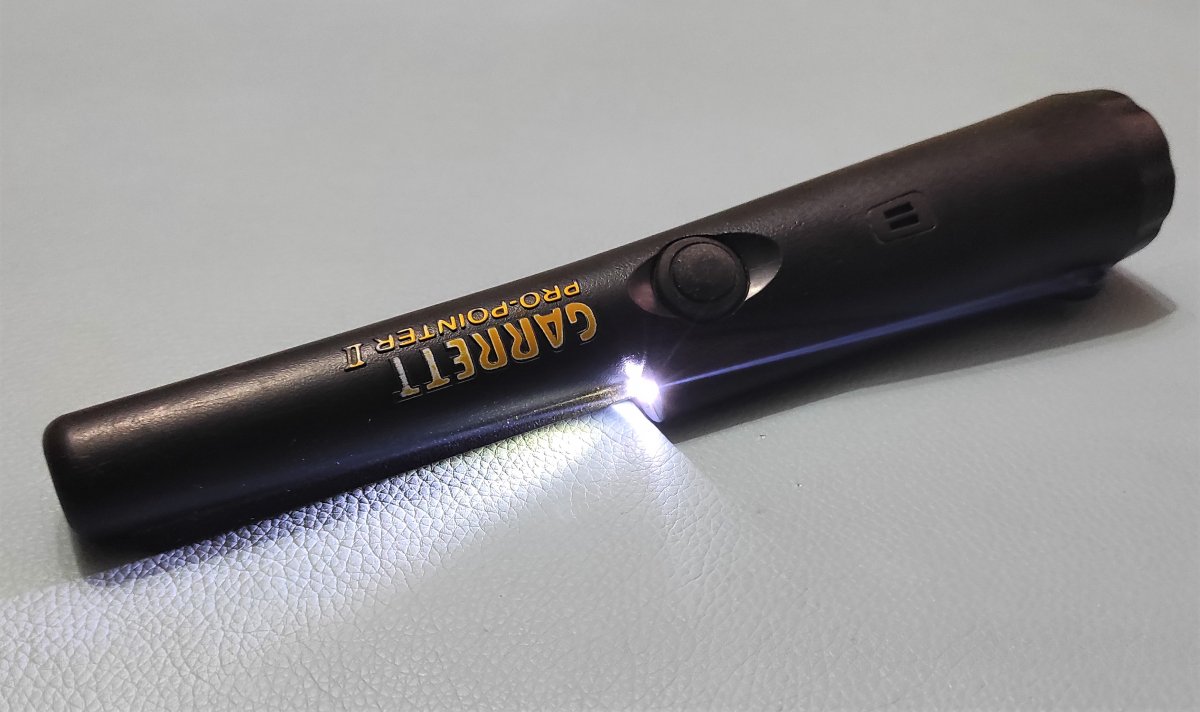
What is so peculiar about salt water?
The largest problem when you go beach hunting with a metal detector is sea salt. The salt from water easily penetrates the ground and makes its mineralization level higher. The high salt content in seawater has a strong effect on a metal detector performance.
It is manifested in chaotic signals you receive, inability to define the required discrimination correctly, losing the detection depth.
A beach, especially a salty one – is a complicated ground for metal detecting. This explains why many metal detectors have Beach as a separate search mode. Inhomogenous humidity and high mineralization, presence of loads of metal rubbish – all these make the device go nuts.
It is quite challenging to set proper ground balance values in this case. If a device doesn’t have ground balance function at all, it may incredibly misbehave on salty sand and produce signals where there is nothing at all.
If the device has a ground balance function, you should adjust it as you approach the water since ground mineralization level changes.
The more humid the sea sand is, the higher is the influence of ground mineralization. For example, you can set the ground balance on dry sand and go metal detecting, but once you get closer to the water’s edge (or when submerging a search coil not very deep), you can get even more false signals from the device. For this reason, you will need a metal detector capable of ignoring high ground mineralization.
Salt also influences the state of metal detectors – it slowly corrodes aluminum shafts. At the same time, the plastic the search coil is made of, and wires covering suffer from salt influence as well. Therefore, don’t leave your metal detector as is after using it in salt water. Wash it with running water or at least wipe it with a wet cloth, it will leave less salt on the device when it gets dry.
Caring for Your Equipment After Saltwater Use
After utilizing your metal detector in saltwater environments, proper care is crucial to ensure its longevity and optimal performance. Here are some recommendations on how to maintain your equipment:
- Rinse with Fresh Water:
After each session in saltwater, thoroughly rinse your metal detector with fresh water. This helps remove salt deposits that can accumulate on the device, potentially affecting its performance over time. - Clean the Search Coil:
Pay special attention to the search coil, as it is exposed to sand, stones, and saltwater. Use a soft brush or cloth to gently clean the coil, ensuring that no debris or salt residue remains in crevices or slits. - Use a Protective Cover:
Consider using a protective cover for the search coil. This helps prevent scratches caused by sand, corals, or stones. Even though modern coils are designed to withstand such conditions, an extra layer of protection can extend their lifespan. - Address Salt Accumulation:
If saltwater has dried on the surfaces of your metal detector, it can affect its performance. Regularly clean the device with running water or a wet cloth, paying attention to areas where salt might accumulate. This simple practice prevents salt build-up and maintains the detector’s functionality. - Dry Thoroughly:
If freshwater is not readily available, ensure the metal detector is thoroughly dried after use. Saltwater can accelerate corrosion, especially on aluminum shafts. Wipe the device with a wet cloth to remove residual salt, promoting its longevity.
By incorporating these maintenance practices into your routine, you can preserve the condition of your metal detector and enhance its durability, ensuring reliable performance during future beach metal detecting expeditions.
Best Spots For Beach Metal Detecting
Areas of high activity
Identifying zones with high activity, such as beach games, sports, or events, can be rewarding for metal detecting. These areas tend to have increased foot traffic and a higher likelihood of people misplacing items in the sand. Pay attention to spots where beachgoers gather for activities, as they may unknowingly drop coins, jewelry, or other valuables during their busy and enjoyable moments. Metal detecting in these bustling areas can lead to exciting discoveries.
The Towel Line
Metal detecting along the towel line, where beachgoers typically set up their towels and belongings, can be particularly fruitful. People often place their valuables near this line, and items may get buried or lost in the sand as they relax or engage in beach activities. Be sure to scan this area thoroughly for potential finds.
Towel line – with dry sand, where usually only coins are found and rubbish such as bottle caps, foil, etc. As for the jewelry, it comprises about 20% of all the above mentioned.
The Shell Line
Beaches often feature a distinct line where shells accumulate, known as the shell line. This natural boundary can be an excellent location for metal detecting, as shells may have shifted or covered objects of interest over time. The shell line can provide a unique environment for uncovering treasures that have become nestled among the seashells. Be sure to explore this area to enhance the diversity of your finds and potentially discover items that have been hidden beneath the shells for some time.
But if you go treasure hunting in salt water, you will have issues with setting ground balance. This problem manifests in phantom/false signals appearance, which can be decreased by reducing the device sensitivity level.
Low Tide Line
On sea beaches, you should follow the water. If it is low tide, go with it to the deeper areas. At high tide, go to the sand and start coin shooting. Metal detecting enthusiasts frequently target the low tide line for various reasons. During low tide, more of the beach is exposed, revealing areas that are usually underwater. This can unveil hidden treasures that have been submerged, washed ashore, or buried by the shifting sands.
Low tide conditions provide an opportunity to explore a broader stretch of the beach, increasing the likelihood of finding items lost or discarded over time. Additionally, objects that were previously out of reach during high tide become accessible, making the low tide line a prime location for beach metal detecting adventures.
Dry Sand vs Wet Sand
Metal detecting on the beach is an exhilarating hobby, but enthusiasts often find themselves at a crossroads when deciding between dry sand and wet sand detection. Each presents its own set of challenges and rewards. Let’s delve into the distinctions between dry sand and wet sand metal detecting:
Dry Sand:
- Ease of Digging: Dry sand offers detectorists a more straightforward digging experience. The loose composition makes it simpler to recover targets quickly, enabling more efficient exploration.
- Stable Targets: Targets buried in dry sand tend to remain stable, facilitating more accurate identification. This stability is advantageous for both beginners and seasoned detectorists seeking precise target recovery.
- High-Traffic Zones: Popular beach spots like towel lines, volleyball courts, and entrances are often located in dry sand. These areas, frequented by beachgoers, are prime locations for uncovering a variety of items, from coins to jewelry.
Wet Sand:
- Deeper Treasures: Wet sand can hide treasures at greater depths due to its denser and more compact nature. Detectorists may unearth older or more valuable items that have settled deeper into the substrate.
- Mineralization Challenges: Detecting in wet sand, particularly near the water’s edge, introduces challenges related to mineralization. The increased moisture content can impact the detector’s performance, necessitating adjustments.
- Tidal Dynamics: Proximity to the water’s edge in wet sand areas requires awareness of tidal patterns. Low tides reveal more expansive hunting grounds, while high tides may restrict access to certain areas.
Ultimately, the choice between dry and wet sand metal detecting boils down to personal preference, the specific treasures sought, and the willingness to navigate the distinct challenges presented by each type of sand. Many seasoned detectorists enjoy the versatility of alternating between both environments to maximize their chances of unearthing hidden gems along the coastline.”
When is the best time to detect on the beach?
Success isn’t just about the equipment; it’s also about choosing the right time to uncover treasures.
Timing is key in the world of beach metal detecting. Whether you’re drawn to the mysteries of low tide, the aftermath of storms, the tranquility of sunrise, or the midweek escape, choosing the right moment can elevate your metal detecting escapades to new heights of excitement and success.”
Tidal Influence:
- Low tide is a metal detectorist’s ally. It unveils more beach area, exposing spots that are usually underwater. Plan your beach escapades during low tide to maximize the potential of discovering hidden gems.
- While low tide is generally preferred, high tide has its perks. Explore the upper part of the beach where sunbathers and beachgoers leave their belongings. People often lose items while moving around, making high tide a surprisingly fruitful time for discoveries.
Post-Storm Excursions:
- Storms can reshape the coastline, unveiling items that were once buried. After a storm, head to the beach to capitalize on this natural phenomenon. Exercise caution, be aware of safety concerns, and enjoy the aftermath of nature’s artistic touch.
Sunrise or Sunset:
- If you’re focusing on the dry sand, consider detecting during the cooler parts of the day – sunrise or sunset. Aside from the more comfortable temperature, these times often offer quieter beaches with fewer distractions, enhancing your concentration and efficiency.
Midweek:
- Weekdays present a unique advantage. Beaches are typically less crowded, providing more space for your metal detecting endeavors. Enjoy a peaceful and potentially more productive experience by planning your searches on less busy days.
Post-Event Hunts:
- After beach events, festivals, or gatherings, seize the opportunity to detect. Attendees may inadvertently leave behind items, creating a prime environment for metal detecting enthusiasts. Your chances of discovering interesting finds significantly increase during these post-celebration hunts.
Ethics of Metal Detecting on the Beach
As you embark on your beach metal detecting journey, it’s essential to strike a balance between the excitement of discovery and the responsibility towards the environment and fellow beachgoers.
Here are some key ethical considerations to keep in mind:
Respect for Public Spaces
- Leave No Trace: Always adhere to the principle of leaving no trace. Fill in any holes you dig and ensure that the beach remains as pristine as you found it. Respecting public spaces ensures that the beach remains enjoyable for everyone.
Follow Local Regulations
- Know the Rules: Familiarize yourself with local metal detecting regulations. Some beaches may have restrictions or require permits. Compliance with these rules not only preserves the environment but also avoids legal complications.
Prioritize Safety
- Mindful Digging: Be mindful of safety while digging. Avoid areas with high foot traffic, and ensure that your activities don’t pose risks to others. Safety should be a top priority to create a positive and secure environment.
Collaboration with Authorities
- Cooperate with Authorities: If authorities or beach management request information or assistance, cooperate willingly. Building a positive relationship with local authorities contributes to the overall image of the metal detecting community.
Responsible Artifact Handling
Preserve Historical Items: If you uncover artifacts of historical or cultural significance, handle them with care. Report significant finds to relevant authorities, as they may hold historical value that goes beyond personal collection.
Courtesy to Beachgoers
- Be Considerate: Exercise courtesy towards other beachgoers. Avoid disturbing their experience by maintaining a reasonable distance and explaining your hobby if approached. A friendly and open attitude can foster understanding.